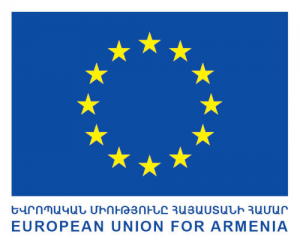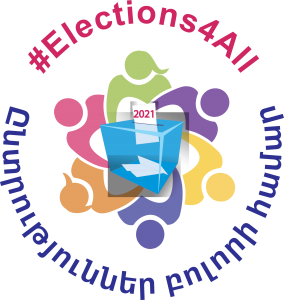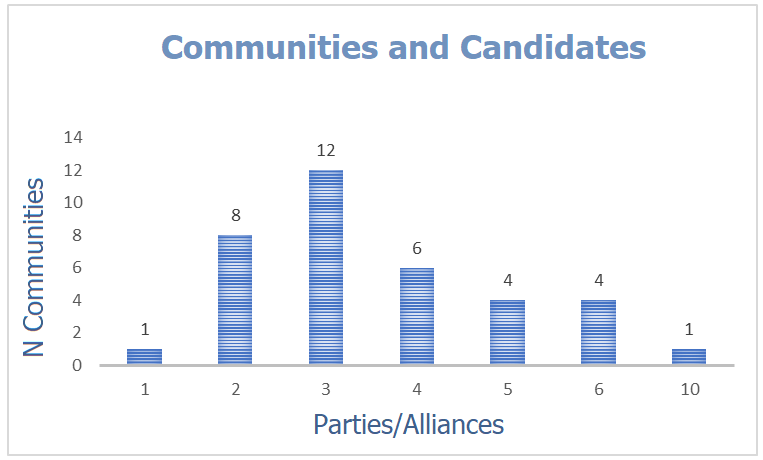 |  |  |
On December 5, 2021, local elections were held in 38 communities in Aragatsotn, Ararat, Armavir, Gegharkunik, Lori, Kotayk, Shirak, Vayots Dzor and Tavush provinces, 36 with proportional and two with majoritarian representation system.
The Independent Observer Public Alliance monitored the election campaign and election day in 143 polling stations and 23 Territorial Electoral Commissions.
The observation mission consisted of 30 long-term observers, 420 short-term observers (including 43 mobile groups), 16 lawyers, 3 media monitoring experts and a 40-member coordinating and communication team.
Long-term observation

Nominated parties and alliances
By the proportional electoral system, a minimum of 1 party/alliance and a maximum of 10 parties/alliances were nominated in 1 community. Two parties/alliances were nominated in 8 communities, 3 in 12 communities, 4 in 6 communities, 5 in 4 communities and 6 in four communities.
A total of 17 parties and 27 alliances were nominated in 36 communities.
Territorial Electoral Commission No. 33 refused to register the Hanrapetutyun Party in Artik community, as the party failed to meet the legal requirement to nominate candidates from at least half of the towns/villages within the community. Territorial Electoral Commission No. 32 erroneously registered the “Ikilikyan” party alliance nominated in Akhuryan community with the same violation. After discovering the mistake, the Territorial Electoral Commission declared the registration of the alliance invalid. The alliance challenged the decision of the commission in court. The court annulled the decision on invalidation of the registration of the alliance, referring to the lack of grounds defined by the Electoral Code. The Civil Contract Party appealed to the court on the matter. The appeal was upheld, and the registration of the “Ikilikyan” alliance was declared invalid.
Ten of the 27 nominated alliances were named after the first number of the alliance, which, in fact, is in contradiction of the logic of the proportional electoral system.
Election campaign
During the long-term monitoring, 59 campaign meetings were monitored, during which interviews were conducted with 78 participants. Interviews were conducted with 158 candidates for the Council of Elders, as well as with the chairpersons and secretaries of the Territorial Electoral Commissions in charge of organizing the elections, 42 chairpersons, secretaries and members of Precinct Electoral Commissions.
Forty-two incidents were registered, on the basis of which 2 crime reports were sent to law enforcement agencies.
Local elections on December 5 were the largest following the amendments to the Electoral Code. Given the number of communities involved, the election campaign had significantly different manifestations, depending on this or that community, the nominated parties and alliances, the candidates and the administrative and financial resources at the disposal of the parties/alliances.
The recent elections in Armenia are characterized by the fact that both local and national authorities possessed administrative resources. Both sides apparently misused administrative resources and other levers of influence, and the influence of local administrative resources was even more apparent. However, administrative resources were largely misused not to force voters, but to gain a campaign advantage.
In a number of communities, the preferential distribution of community budgets under the name of various social programs and support had a significant impact. It is noteworthy that during the snap parliamentary elections criminal proceedings were instituted for carrying out the same actions, but no action was taken during these elections.
The abuse of administrative resources in Artik and Artashat communities was expressed by providing bonuses to supporters.
During the campaign, the state and communal authorities greatly speculated on the subsidy programs (for example, asphalting works in Vanadzor, Artashat, procurement of property, etc.), and sometimes projects implemented by other institutions (for example, the grand opening of a renovated stadium in Armavir). During the campaign, the Vayk community municipality disseminated information about the acting mayor organizing asphalting works, acquiring property for the community and other activities at his expense, which was both a misuse of community media resources and a prohibited combination of campaign and charity.
In the case of community leaders who did not belong to the ruling party, the availability of administrative resources and business opportunities were essential tools, especially being a large employer at the community level (for example, in the case of the Karen Yeghiazaryan Alliance in Aparan).
One of the problematic cases of the pre-election period was the alarms about violations of labor rights for political reasons, imposing administrative penalties or simply dismissal by employers. Although unique cases in this category are made public, most of them remain unreported, making it virtually impossible to protect a person’s rights.
One of the key issues identified during the observation mission was the tendency to avoid financial accountability and transparency. In interviews with candidates for the Council of Elders, the vast majority of them claimed that all the staff of the election headquarters were involved on a voluntary basis, while the staff stated that they were paid. Candidates who mentioned that the employees were paid rarely stated that the expenses were covered by the pre-election fund.
There were patterns in the self-withdrawal of candidates in different communities, from which it can be concluded that in some cases the inclusion in the pre-election lists was merely done to ensure a quota so that the given party/alliance could participate in the elections.
As in the previous two local elections, the recent Nagorno Karabakh war was manipulated by both sides, and the short-term clashes on the Armenian-Azerbaijani border on November 16 also affected the campaign.
It should be noted, however, that due to both the above-mentioned circumstance and other objective and subjective factors, the election campaign did not take place in several communities or was organized very superficially, although there was actual competition and involvement of different parties. For example, in Spitak, Pambak, Tumanyan, Ashtarak, Baghramyan, Khoy, Metsamor, Vardenis, Garni, Tsakhkadzor, Hrazdan, Nairi, Nor Hachn, Ashotsk, Jermuk, Vayk communities, there were no public campaigns, rallies or other similar activities during the monitoring period.
Main violations observed on the voting day
The short-term mission conducted a permanent observation of 143 out of 984 polling stations formed in the above-mentioned communities from 07:00 on December 5, 2021 until the end of the vote tabulation process. There were 43 mobile observer groups in those communities. During the voting, the mobile groups visited 254 out of 621 towns/villages of 38 consolidated communities and 392 precincts of those towns/villages. The work of 23 Territorial Electoral Commissions in charge of the elections of the above-mentioned communities was also observed after 20:00.
Although there were unique procedural irregularities during the sessions of the commissions, the presence of multiple proxies of the same parties or alliances in the precinct center, as well as their simultaneous registration in the register, were the leading and persistent problems during the voting day. In this respect, the ignorance of the PECs and parties was widespread (and probably due to different regulations for parliamentary and local elections).
The main violations recorded by the observers in the polling stations observed during the voting were as follows:
- More than one person entering the voting booth at the same time,
- Disclosing voting choice or violation of the secrecy of the ballot, <

